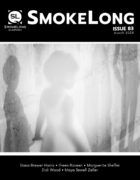I love how this story makes use of seemingly mundane details to explore the conflicts between the characters, such as the second-person speaker and her sister watching Gilligan’s Island: “… imagining she was Ginger, the desirable one, and you Mary Ann, the other one.” Do you have any advice on writing the mundane in an unexpected and meaningful way?
Whatever lofty ideas motivate us, most of our moments are steeped in the mundane, and I think it’s mostly about noticing—collecting details from the world around you and employing them strategically for maximum resonance. I admire how artfully Cathy Ulrich does this in her stories—her collection Ghosts of You is a master class in the exploration and elevation of the seemingly mundane.
In the first draft of “A Three-Hour Tour,” there was nothing about Gilligan’s Island. I knew the sister’s ringtone should be significant but didn’t know yet what it was, so I typed “[catchy ringtone]” as a placeholder and kept writing. When revising, I considered what might be shared by the sisters, perhaps something from their childhood, and the memory of them watching this show together emerged. Even back then, they’re aware of their differences and choose to emphasize them through the characters. With Gilligan’s Island in mind, I noticed how isolated the main character is now, stranded like a castaway while those around her sail onward, and I continued following that thread, adding details like the fish counter and the mango, the name of the restaurant, and eventually the title, a line from the theme song commenting on how something that was supposed to be brief ends up going disastrously on and on, with no rescue in sight.
I often find writing about the COVID pandemic, and the politics surrounding it, to be difficult since we’re still living through it. Can you speak to what it’s like to write through crises that are so fresh in our memory?
I tend to avoid hot-button topics, especially now, with everything so politicized and people so polarized. There’s so much noise. Is anyone actually listening? I was not planning to write a pandemic story, but in a workshop led by Tommy Dean, we were given a prompt about setting as character and told to start with something menacing to our main character. I couldn’t think of anything more menacing than a raging, organ-altering, immunity-destroying virus combined with a political climate encouraging ongoing reinfection. It’s heartbreaking and terrifying to see so many entrenched in positions beyond common sense, compelled to act against not only a greater good but also their own best interests. I figured I’d draft something to get it out of my head, and then put it aside and write something less current “for real.” When it was done, though, I realized it wasn’t just about the COVID crisis—it’s about the continuing damage to relationships and society, shown from the perspective of one person trying to stay safe in a world where it’s increasingly difficult to protect oneself and others.
One of the things I love about fiction is that a writer can present something obliquely, and someone who might have turned away if it had been stated directly might continue reading, might gain an understanding they didn’t have before. Kathy Fish does this beautifully in the exquisite “Collective Nouns for Humans in the Wild,” which portrays the horror of gun violence in a fresh and breathtaking way.
I love the use of line breaks in this story and the refrain, “and,” used to start each new section; it gives the prose a poetic quality. Was this form something you set out to achieve initially, or did it come to you through the revision process?
I didn’t set out with form in mind—I heard the first line in my head and went from there, and the form emerged as I wrote. I realized as I was writing that the repeated “and” emphasized the cumulative, overwhelming effect of all this negative input on the main character. I found the breaks helpful while drafting for keeping everything straight, visually, and they made it easier to rearrange a few sections later. When revising, I tried eliminating them, to present the story as the breathless paragraph it is, but I didn’t like that as much. I see the breaks as these huge gulps of air between thoughts, intensifying the tension; they also foreshadow what the main character hears from her sister at the end.
Second-person point of view is notoriously challenging to pull off, and this story does so beautifully—the narrator is both distanced from themselves and made to feel universal with the reader. What challenges did you encounter writing in this point of view, and what does this point of view allow us to explore as writers and readers that other POVs don’t?
I love writing in second person! I find that different stories call for different perspectives—I play with lines in my head, listening until it feels right, and then I run with it. It’s only challenging if it’s the wrong perspective for the story. This story was always in second; third would have been too distant, too easy to dismiss, and first could have come off as sanctimonious. Second draws the reader in and encourages their involvement, their complicity, their understanding—exactly what I needed for this story to have any chance of working.
What is next for you in your writing life? Any new projects or forthcoming work you can tell us about?
After a long dry spell (writers: don’t give up!), I have two more stories out this month, in Fractured Lit and Fictive Dream, and others out on or nearly ready for submission. I’m also playing with the contents and order of a story collection. I keep hoping some lovely press will reach out and beg to publish it, thus saving me from further dithering [insert “call me” emoji].



 Included in the price of SmokeLong Fitness:
Included in the price of SmokeLong Fitness: